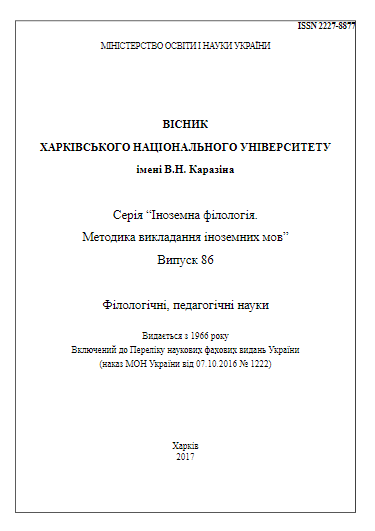Constructions be + participle II and have + participle II in the process of developmentof category of retrospective coordination in English
Abstract
The article is devoted to the study of the syntactic constructions be + participle II and have + participle II in the process of the development of the category of retrospective coordination taking into account a state of the language system in Old English, Middle English and Early New English on the basis of the Gospel translations: Anglo-Saxon translation 995; Wycliffe 1389; Tyndale 1526, Authorized Version of 1611. The process of the extension of descriptive forms with a perfect meaningis analyzed. The role of the prefixes a- and ge- in the process of the development of perfect forms is defined, the meanings of the verbs with prefixes are considered in a certain situation of communication. The usage of perfect forms with transitive and intransitive verbs is considered in all the periods of the development of the grammatical system of English. The development of perfect forms is considered from the point of view of functionality of the existing variants, emerging as a result of the influence of internal and extralinguistic factors. The contacts with other languages and dialects and the result of their influence on English in the periods consideredare studied in detail. The conclusionis made that perfect forms are essentially Germanic, developed on the basis of the construction of the verb have with participle II. Celtic languages, Scandinavian dialects and the Norman dialect of French influenced the process of forming the verb have as an auxiliary verb of perfect forms. The reduction of Old English prefixes played a decisive role in the development of the category of retrospective coordination. Prospects for further consideration of the forms of the English verb with the use of a system-functional approach as a base of historical sociolinguistics are outlined.
Downloads
References
Гурова Ю.И. Этапы становления неличных форм английского глагола с точки зрения исторической лингвистики / Ю.И. Гурова // Международный журнал экспериментального образования. – 2014. – № 3-1. – С. 132–136.
Лабов У. Исследование языка в его социальном контексте / Уильям Лабов // Новое в лингвистике. – Вып. 7. – 1975. – С. 96–182.
Литвак С.Я. Новые тенденции в функционировании английского перфекта / С.Я. Литвак // Держава та регіони. Серія: Гуманітарні науки. – 2012. – Вип. 2. – С. 51–54.
Литвак С.Я. Теоретико-методологічний аналіз граматичних категорій англійського дієслова / С.Я. Литвак // Вісник Дніпр. ун-ту. – Серія: Мовознавство. – 2013. – Т. 21, вип. 19(2). – С. 104–112.
Логунов Т.А. К вопросу об эволюции средств выражения будущего (на материале английского языка) / Т.А. Логунов // Вестник Кемеровского государственного университета: журнал теоретических и прикладных исследований. – 2012. – № 4 (52). – Т. 4. – 42–46.
Павленко А.Е. Аналитические конструкции в английских диалектах: автореф. дис. на соискание уч. степени канд. филол. наук: спец. 10.02.04 "германские языки" / А.Е. Павленко. – Санкт-Петербург, 1993. – 17 с.
Пименков В.Ф. Становление перфекта непереходных глаголов с вспомогательным глаголом habban в древнеанглийском языке / В.Ф. Пименков // Вопросы филологии английского языка: сб. трудов Моск. обл. пед. ин-та. – 1974. – Вып. 2. – С. 3–23.
Решетникова Н.Д. Развитие глагольных категорий в английском языке / Н.Д. Решетникова // Филология и лингвистика в современном обществе: материалы III Междунар. науч. конф. – М. : Буки-Веди, 2014. – С. 92–95.
Сабанеева М.К. Историческая грамматика французского языка / М.К. Сабанеева, Т.М. Щерба. – Л. : Изд-во Лен. ун-та, 1990. – 270 с.
Смирницкая О.А. Эволюция видо-временной системы в германских языках / О.А. Смирницкая // Историко-типологическая морфология германских языков. – М. : Наука, 1977. – С. 5–27.
Чурюмова А.О. Развитие временных глагольных форм в английском языке (в диахроническом аспекте) / А.О. Чурюмова // Молодой ученый. – 2012. – №7. – С. 181–184.
Штейнберг Н.А. К проблеме глагольной префиксации в древнеанглийском языке / Н.А. Штейнберг // Исследования по английской филологии : сб. трудов Лен. гос. ун-та. – 1974. – № 4. – С. 59–64.
Brinton L.J. The Differentiation of Statives and Perfects in Early Modern English: The Development of the Conclusive Perfect / L.J. Brinton // Towards a Standard English: 1600 – 1800 / Ed. by Pieter Stein, Ingrid Tieken-Boon van Ostade. – Berlin-New York : Mouton de Gruyter, 1994. – P. 135–170.
Greene D. The Irish Language / D. Greene – Dublin : The Three Candles, 1966. – 61 p.
Hopper P.J. Aspect between Discourse and Grammar / P.J. Hopper // Tense and Aspect. – Amsterdam, 1982. – P. 76 – 89.
Traugott E.C. A History of English Syntax: A Transformational Approach to the History of English Sentence Structure / E.C. Traugott. – New York et. al. : Holt, Rinehart and Winston, Inc., 1972. – 216 p.




